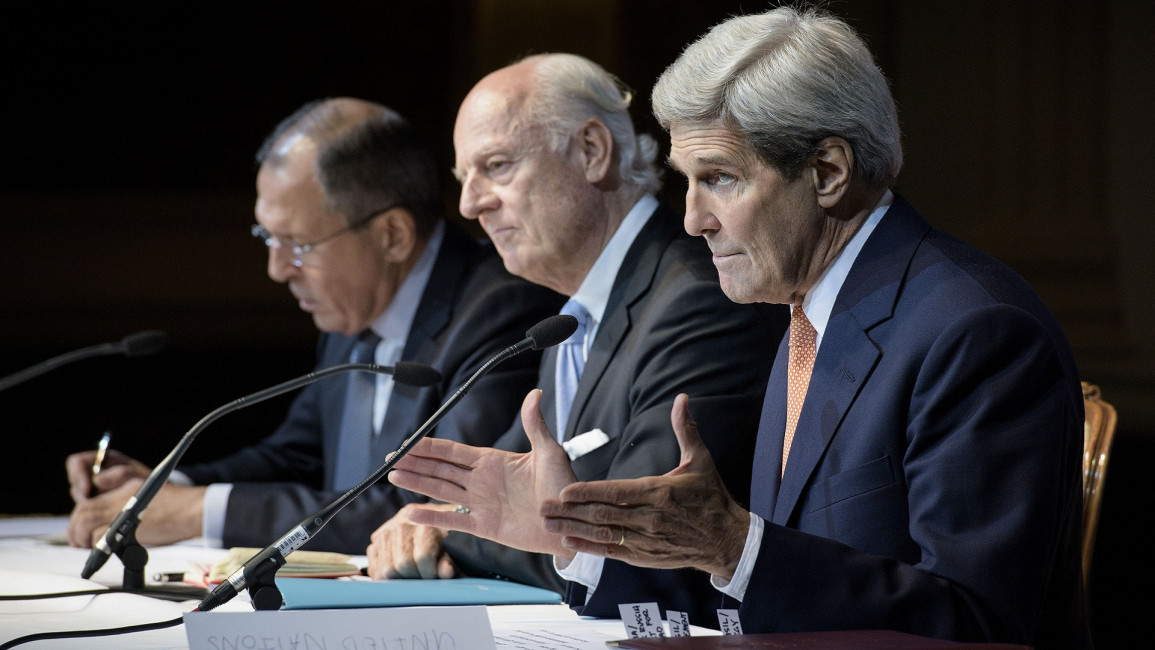Syria foreign minister says Vienna talks statement 'important'
After meeting with UN peace envoy Staffan de Mistura in Damascus Sunday, Syrian Foreign Minister Walid al-Muallem welcomed the statement that emerged from the Vienna summit, according to Syrian state television.
The station said Walid al-Muallem had "expressed to... De Mistura the importance of numerous points" in the statement released at the end of the Vienna talks.
| The solution to the Syrian question is elections and an end to military and financial aid to the opposition - Ayatollah Ali Khamenei |
De Mistura's meeting with Walid al-Muallem in Damascus came two days after attending international talks on Syria's conflict, a UN official said.
The Syrian newspaper Al-Watan, which is close to the government, said the UN envoy was in Damascus to brief officials on the "details" of the Vienna talks.
De Mistura was expected to leave Damascus Monday, the UN official said, declining to provide further details on the diplomat's visit.
Participants at the talks agreed to ask the UN to broker a peace deal between the regime and opposition to clear the way for a new constitution and UN-supervised elections.
Iran: Only way out is 'elections'
Meanwhile, Iran's Supreme Leader Ayatollah Ali Khamenei said elections should be held in Syria to end the civil war there and criticised foreign powers that arm and fund Syrian opposition fighters, state television reported.
In an annual address to Iran's top diplomats, Khamenei also said that US objectives in the Middle East were the opposite of Iran's and that negotiating with Washington on regional issues was meaningless.
Foreign Minister Mohammad Javad Zarif attended the meeting after returning from inconclusive talks with world powers in Vienna Friday aimed at finding a solution to the war, the first time Iran had participated in such talks.
"The solution to the Syrian question is elections, and for this it is necessary to stop military and financial aid to the opposition," several state media outlets quoted Khamenei as saying.
The Vienna talks were attended by 17 countries including the United States, which has called for Assad to leave power as part of a political transition process.
He has refused to do so.
But Khamenei, who tolerated talks with the United States to reach a deal on Iran's disputed nuclear programme in July, has ruled out negotiating with Washington on any other issue.
"The Americans are trying to impose their own interests, not resolve issues, 60 or 70 percent through negotiations and the rest through illegal actions. So what is the meaning of negotiating with them?" the Iranian leader said.
More US support pledged for Syria rebels
Officials said the United States is ramping up its support for Syria's opposition with a pledge of nearly $100 million in fresh aid Saturday.
Deputy Secretary of State Antony Blinken announced the additional assistance at the Manama Dialogue security conference in the Gulf island nation of Bahrain, where discussion of Syria dominated the gathering of mostly Western and Arab officials.
The American promise of cash, which it says brings to nearly $500 million the amount it has pledged to the opposition since 2012, came a day after the United States announced it was intensifying its fight against the Islamic State group [IS, formerly ISIS] in Syria with the deployment of up to 50 special operations troops.
The new US funds will support local and provincial councils, civil society activists, emergency services and other needs on the ground inside Syria.
Saudi Foreign Minister Adel al-Jubeir told delegates that the timing of Assad's departure and the withdrawal of foreign fighters remain the main sticking points to finding a lasting resolution to the civil war in Syria.
British Foreign Secretary Philip Hammond said the fact that the talks in Vienna included regional rivals Saudi Arabia and Iran was an achievement in itself.
But Jubeir, who arrived from Vienna overnight, seemed to downplay the significance of what had been accomplished, declaring in Bahrain, "We have not been able to reach agreement."
He said the oil-rich kingdom's policy toward Syria has not changed, and that it would continue to support what he called the moderate Syrian opposition.
He described the presence of foreign forces, particularly Iranian troops, as a roadblock to ending the fighting in the Syria's war.
Iran has deployed what it says are military advisers to support the government and has had casualties in the conflict, though it denies the presence of Iranian combat troops in Syria.
Jubeir also made clear that the negotiations had done nothing to change Saudi Arabia's position that Assad must go. "Ideally he should leave this afternoon. The sooner the better," Jubeir said.
Kerry to visit London for Syria talks
Meanwhile, US Secretary of State John Kerry will visit London this week to discuss the situation in Syria and other matters, his spokesman said Monday.
"While in London, he will meet with British Foreign Secretary Hammond to discuss a range of bilateral and global issues, including Syria," State Department deputy spokesperson Mark Toner said during Kerry's visit to the Kazakh capital Astana.
 |


![President Pezeshkian has denounced Israel's attacks on Lebanon [Getty]](/sites/default/files/styles/image_684x385/public/2173482924.jpeg?h=a5f2f23a&itok=q3evVtko)



 Follow the Middle East's top stories in English at The New Arab on Google News
Follow the Middle East's top stories in English at The New Arab on Google News


